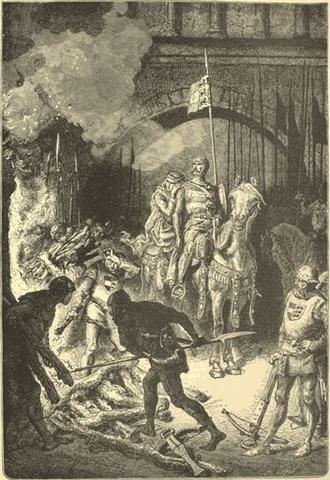http://www.culturespain.com/culture-of-spain/culture-spain-el-cid-spanish-national-hero-and-extraordinary-soldier
CULTURE SPAIN: EL CID (SPANISH NATIONAL HERO AND EXTRAORDINARY SOLDIER)
El Cid is one of the great heroes of Spain and, unlike Britain’s beloved King Arthur, he is someone who really existed.
Born sometime in 1040, close to Burgos in the kingdom of Castille, El Cid was a true adventurer who had an extraordinary life, during which (somehow) he managed to survive despite fighting, at various times, for both the Moors and for the Spanish. By the end of his life, this remarkable soldier had carved out his own fiefdom in Valencia. This he ruled with little more than cursory attention to King Alfonso VI – the most powerful Christian king in Spain at the time.
Of course, to many people, the image of El Cid that springs to mind is that imprinted by the great 1961 Hollywood epic of the same name, in which Charlton Heston and Sophia Loren star. The most memorable image of the film is when a dead El Cid, fully armoured, is strapped to his war horse, Babieca, and led into battle – just as the dastardly Moors are about to conquer the Spaniards. Finding the great El Cid unkillable, the Moors retreat in terror…
In fact, probably to the surprise of anyone who knew him in real life, El Cid died peacefully! Equally, it would certainly be wrong to think that it was El Cid who drove the Moors from Spain. This was far from the truth.
Indeed, shortly after El Cid’s death, Valencia itself was beseiged by the Almoravid Moors who successfully took the city and remained there until 1238. It then took until 1492 (another two hundred and fifty four years!) before the last controlling Moors in Spain were expelled from the country.
However, El Cid is something of a titan figure for the Spanish Reconquista and, to some extent, fits the picture of a roving medieval knight. Certainly, he was clearly a warrior to be reckoned with, both as a fighter and a leader – and he fought in, literally, countless battles.
To the Spanish, he was known as El Campeado, which is literally The Champion and this title may have been awarded following his killing of another knight in single combat. However, it is more likely that he was called El Campeador because of his undoubted skills as a military commander. To the Moors he was simply known as El Cid (‘Lord’ or ‘Master’).
El Cid’s real name was Rodrigo Diaz de Bivar and he was son of a minor noble. However, his battlefield exploits quickly made him a major figure and at the early age of 22 he was made the standard bearer of King Sancho of Castille. Unfortunately, at the time, King Sancho was at war with his brother King Alfonso of Leon who, upon Sancho’s death, inherited the kingdom of Castille.
El Cid’s previous success against King Alfonso did not endear him to the new king and El Cid soon found himself sidelined. Thta sai, he did not help his own cause with King Alfonso VI when he led an unauthorised (but successful) attack against the city of Toledo, which was under Alfonso’s protection. Furious, Alfornso banned him from his kingdom. This was a dangerous thing to do to a military commender who had never lost a battle!
El Cid promptly went to serve the Moors in Zaragossa where he stayed for ten years, inflicting defeats upon any of his new master’s enemies. These included Christian and Moors alike.
Evntually, King Alfonso VI asked El Cid to rejoin him. The Berber Almoravid invasion of Spain had just occurred and Alfonso had been crushed by them at the Battle of Sagrajas (1086). However, it seems that El Cid did little to help Alfonso, despite appearing at court – probably because he was now set upon creating his own ‘kingdom’. This he did in Valencia after capturing the city in 1094, after a long siege and some very clever political manoeuvring.
By anyone’s standards El Cid was an exceptional soldier but he was a lot more than just a brave and effective fighter. He is remembered for being a great general, a fine tactician, a good planner and someone who was able to command considerable loyalty from his followers, whether Muslim or Christian. To spend a lifetime fighting in a continuously volatile time and never lose a battle is an extraordinary feat – which must make El Cid one of the great battlefield commanders of all time.
El Cid may not have driven the Moors from Spain – but he still rightfully deserves to be remembered as one of Spain’s truly great national heroes. An intrinsic part of the culture of Spain, El Cid holds a position within Spanish culture that is not unlike Britain’s King Arthur – but El Cid, amazingly, was for real…
RELEVANT INFO: ‘What Did the Moors do for Us’
Share and Enjoy:











- via Feeddler RSS Reader


No comments:
Post a Comment